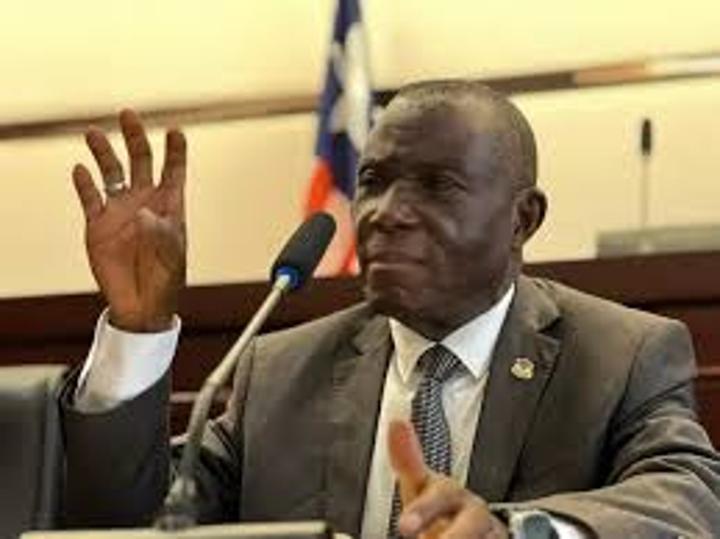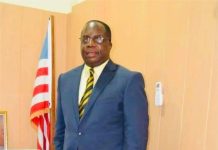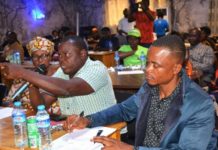Africa-Press – Liberia. Liberia’s ongoing struggle against illicit drug activity has been marked by frequent changes in leadership, particularly at the Liberia Drug Enforcement Agency (LDEA).
The agency, tasked with curbing the proliferation of narcotics in the country, has experienced yet another abrupt shakeup with the dismissal of Director General Anthony Suoh in less than a year into his tenure by President Joseph Nyuma Boakai, Sr.
This has cast a spotlight on the chronic instability within the LDEA, raising pressing questions about effective governance and the nation’s ability to respond to its growing drug crisis.
Souh’s appointment
The appointment of Anthony Suoh as Director General of the LDEA came at a critical juncture for Liberia’s drug enforcement landscape. Nominated by President Boakai on November 1, 2024, Suoh was chosen to replace Colonel Abraham Kromah following a highly publicized disturbance at the LDEA headquarters.
This incident, which occurred on June 3, 2024, involved a violent confrontation in which Hassan Fadiga, then Deputy Director for Operations, allegedly brought a weapon into Kromah’s office. The situation quickly escalated, compelling agency personnel to intervene and attempt to disarm Fadiga, resulting in chaos described by President Boakai as “unacceptable” and a threat to public safety. The aftermath of the incident prompted the dismissal of Colonel Kromah and his deputies, opening the door for Suoh’s nomination.
During his confirmation hearing before the Senate Committee on National Security, Defense, and Veteran Affairs on November 20, 2024, Suoh outlined an ambitious reform agenda. He pledged to implement rigorous vetting and auditing processes to address internal weaknesses, with a particular focus on the large number of “Action Agents” operating under LDEA endorsement but not listed on the official payroll. Suoh’s commitment to providing these agents with legitimate opportunities through formal training and procedures was widely welcomed, signaling hope for a new era of professionalism and accountability within the agency.
Despite Suoh’s reformist zeal, his tenure was beset by persistent challenges. The LDEA continued to grapple with inadequate logistical support, hindering its ability to effectively counter drug-related activities.
Suoh attempted to modernize the agency’s operations by introducing advanced detection techniques and enhancing recruitment efforts. His goal was to reduce the prevalence of unqualified “Action Agents” while bolstering the agency’s overall capacity. Over 1,500 individuals were identified as having LDEA-issued identification and uniforms but were not officially employed by the agency. Suoh’s initiative to audit, vet, and train these personnel sought to instill legitimacy and boost morale among the ranks.
In addition to internal reforms, Suoh faced the daunting task of restoring public confidence in the LDEA. Previous disturbances and leadership controversies had eroded trust in the agency’s ability to fulfill its mandate. Suoh’s efforts to promote transparency and accountability were viewed as steps in the right direction, though critics remained skeptical about the sustainability of such changes given the agency’s history of instability.
On August 27, 2025, at approximately 11:45 PM, a presidential press release announced the dismissal of Anthony Suoh as Director General, along with his deputies Gwee K. Porkpah (Administration) and Sebastian Farr (Operations).
The official statement cited “administrative reasons known only to the President” for the abrupt removal, leaving the public and stakeholders speculating about the underlying causes. This sudden leadership change marked the end of Suoh’s tenure in less than a year, echoing earlier abrupt dismissals that had become a pattern at the LDEA.
The timing and nature of the announcement reignited concerns surrounding the agency’s leadership instability. With previous heads and deputies ousted following controversies or operational failures, stakeholders worried that frequent changes could undermine the LDEA’s effectiveness and continuity in combating drug trafficking and abuse.
The revolving door of leadership at the LDEA has significant implications for Liberia’s anti-narcotics strategy. Frequent changes at the top create uncertainty, disrupt policy implementation, and impede long-term planning. For an agency already struggling with logistical and operational challenges, such instability risks undermining morale among personnel and diminishing public trust.
The removal of Suoh and his deputies raises questions about the criteria used for leadership appointments and dismissals within the agency. If administrative reasons are not disclosed or subjected to public scrutiny, it becomes difficult for the government to assure stakeholders that decisions are being made in the nation’s best interest. The lack of transparency also fuels rumors and speculation, which can further erode confidence in the agency’s leadership and mission.
Moreover, Liberia’s continued battle against narcotics requires a stable and well-resourced enforcement agency. The country faces growing threats from drug trafficking networks, both domestic and international, and the LDEA’s leadership must be equipped to respond effectively. Disruptions in leadership can stall progress on critical reforms, delay the adoption of modern detection techniques, and compromise efforts to professionalize the workforce.
The Interim Team
In the wake of Suoh’s dismissal, President Boakai moved swiftly to appoint an Interim Management Team to steer the agency through the transition. Deputy Commissioner of Police (DCP) Fitzgerald T. M. Biago of the Liberia National Police was named Officer in Charge, supported by Ernest T. Tarpeh, Assistant Director for Special Services at the National Security Agency, as Deputy for Administration and Investigation, and Assistant Commissioner of Police (ACP) Patrick B. Kormazu of the LNP as Deputy for Operations.
The new leadership is tasked with maintaining stability and continuity within the agency while a comprehensive review of the LDEA’s structure, functions, and operations is underway. President Boakai has directed the Minister of Justice to conduct this review and submit detailed recommendations within 90 days. This initiative signals a recognition of systemic issues within the agency and the need for reforms that go beyond individual leadership changes.
Public reaction
The repeated ousting of LDEA directors has drawn concern from policymakers, civil society organizations, and international partners. Many view the agency’s instability as a major obstacle to progress in Liberia’s fight against narcotics. Calls for greater transparency in appointments, clearer criteria for dismissals, and sustained support for institutional reforms have intensified in the wake of Suoh’s removal.
As the Interim Management Team undertakes its mandate, expectations are high for a thorough and impartial review of the LDEA’s operations. The hope is that the recommendations will pave the way for lasting reforms that enhance the agency’s effectiveness, ensure accountability, and restore public confidence. The government’s willingness to address internal weaknesses and invest in capacity-building will be critical to the LDEA’s future success.
Finally, the brief tenure and ousting of Anthony Suoh as Director General of the LDEA illustrate the deep-seated challenges facing Liberia’s drug enforcement efforts. Leadership instability, operational shortcomings, and lapses in transparency have plagued the agency, hindering its mission to combat the country’s growing drug crisis. As Liberia embarks on a comprehensive review of the LDEA, the nation stands at a crossroads: the path forward must prioritize stable leadership, institutional reforms, and sustained investment in anti-narcotics strategies. Only then can the LDEA fulfill its mandate and play a decisive role in safeguarding public safety and strengthening Liberia’s future.
Source: Liberia news The New Dawn Liberia,
For More News And Analysis About Liberia Follow Africa-Press






